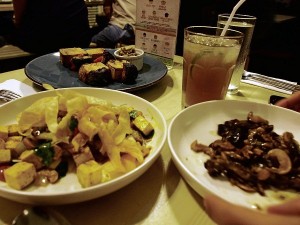Meatless Monday campaign gains political ground

VEGETARIAN FOOD. Fruits, vegetables and grains provide the best nourishment for the frontal lobe of the brain. Arachidonic acid and large molecules in meat weaken it.
PROPONENTS OF the Meatless Monday (Luntiang Lunes) campaign announced that it was able to get Congress to file the “Meatless Monday Bill” via the committee on environment’s Rep. Teddy Casiño in time for the Nutrition Month of July.
This development was disclosed by neuroscientist Custer C. Deocaris, PhD, a balik scientist and founding chair of Meatless Monday Philippines.
Deocaris said in a statement that Casiño would be scheduled to deliver a privilege speech about Meatless Monday on July 27. The bill will be deliberated on in the Lower House in August.
Running out of time
Deocaris said: “The bill has to be approved by the Senate, the Lower House and the President to be made into law. We are running out of time because of the scheduled national elections in May, and all the legislators will be busy with their own campaigns. To my knowledge, this will be the first piece of legislation in the world to change an entire generation’s dietary habits.”
Article continues after this advertisementThree months ago, Deocaris computed that if the 15-million Filipinos who switched off their lights in the 2009 Earth Hour went without meat for just a day, it would be equivalent to 150,412 trees planted and grown for 10 years. That would also have prevented carbon dioxide emissions from 2,489,404 liters of gasoline, or 177,941.57 LPG tanks, kept 1,150 passenger vehicles off the streets for a year, and produced 23.79 carbon emission reduction credits in a day in the Ambuklao dam. Overall, this would have reduced Filipinos’ carbon dioxide production by 5,866,068.516 kg.
Article continues after this advertisementNot hostile to human existence
Deocaris said every Filipino going meatless even for just one lunch would reap the benefits of a future Earth that is not hostile to human existence. A separate computation showed one meatless lunch by 97 million Filipinos would have been equivalent to 12,722,851 kg of CO2 saved (if all protein of the average Filipino diet with meat is replaced by soya during this meatless lunch). This would also be equivalent to the amount of CO2 saved from 5,399,241 liters of gasoline.
A meatless lunch would also be equivalent to the amount of CO2 saved when 2,494 cars are taken off the road for one year. It would be equivalent to the CO2 sequestered by 326,227 trees, or the CO2 prevented from being released from 385,935 LPG tanks. It also would have saved 2,365,755 animals from slaughter.
Livestock farming (cattle, pork, poultry, etc.) accounts for the use and pollution of 70 percent of the global freshwater and 38 percent of land-use conversion. In fact, 70 percent of the Amazon Rain Forest has already been cleared for grazing and feed crop production. It takes about 12,000 liters of water to produce 1 kilogram of beef, compared with just 850 liters to produce the same weight of wheat.
A recent analysis by Goodland and Anhang, coauthors of “Livestock and Climate Change” in the latest issue of World Watch magazine, found that livestock and their byproducts actually account for at least 32.6-billion tons of carbon dioxide (CO2) per year, or 51 percent of annual worldwide GHG emissions.
Inquirer Science and Health recently featured two schools—Tarlac State University and Sophia School in Bulacan—which signed memorandums of agreement on Meatless Monday. Sophia School in Meycauayan City decided to offer only vegetables, vegemeat (vegetable fiber made to taste like meat) and fruits in its school canteen every Monday. What was originally planned as just a once-a-week experiment eventually spread out to other schooldays, as well.